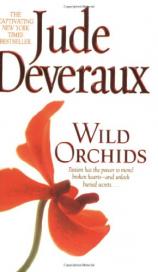Wild Orchids
Review
Wild Orchids
What if you met the Devil and found him to be a strikingly
attractive, charming individual who shared all of your interests,
fed you well, emphasized the beautiful aspects of nature and life,
and even gave you the power to prevent terrible events from
occurring?
Jackie Maxwell, a university professor's assistant and budding
photographer (wild orchids is her favorite subject), is given such
an opportunity upon returning to her mysterious hometown of Cole
Creek, North Carolina. Leaving a young man at the altar, Maxwell
joins the company of bestselling author Ford Newcombe, whom she
meets at a party. Maxwell is a cute, rather forward girl half
Newcombe's age, making her the perfect assistant to Newcombe, a
portly yet handsome widower who has had far too many female
assistants come into his employ hoping to become his lover and
wife, rather than his confidant and muse.
It has been too many years since Newcombe published a new book. His
writer's block attributed to the tragic death of his wife Pat, the
woman who had been his primary inspiration and literary agent.
Newcombe has been so Salingeresque in his silence that critics and
readers are wondering aloud if it was Pat, rather than Ford, who
was the genius behind the fiction.
The journey for Newcombe and Maxwell finally begins when the latter
gives the author the inspiration he has sought --- a real-life
small town murder mystery involving a woman who had loved the
devil. Newcombe has studied hundreds of stories involving hauntings
and ghosts, wondering how his art could serve to bring Pat back to
life. Yet, in all his recent labors, Newcombe has never seen a
nonfiction devil story, especially one that led to the death of the
victim --- a murder by a pressing of stones involving numerous
killers --- and a dramatic coverup, all in the pure southern town
of Cole Creek.
While the premise of the story is tremendous, Deveraux's style and
construction leave much to be desired, especially for a New York
Times bestselling author. Narrated in alternate chapters by Maxwell
and Newcombe, the story is repetitive and the delivery childish,
reading like a Nancy Drew mystery or teen novel. He doesn't even
begin taking notes for any kind of a story until page 285, leading
the reader to believe that he will never tell the "devil story."
More frustrating is Newcombe's simple language and frequent
statements like: "Even though I'm a writer, I couldn't think of
anything adequate to say…" "But there were no words in any
language to explain how amazed I was." and "Me, the wordsmith, had
not one word in my head that I could think of to say." A writer
with nothing to say is worse than a reader with nothing to read,
other than a book by a writer with nothing to say.
Meanwhile, Maxwell meets and likes the Devil, paralleling the life
of the woman who came before her, the one who was executed for her
strange love. Yet, Maxwell's premonitions of the terrible events
that she and Newcombe can prevent are so obtuse that they fail to
propel the story forward. For example, Maxwell dreams that she sees
a car accident involving teens. The teens are laughing, standing
near the wrecked car, in total disbelief that they survived unhurt.
Then the car explodes, sending their body parts hurling through the
air. Later, while out on a drive, Maxwell and Newcombe see the
accident and the teens. The author and his assistant jump out of
Newcombe's vehicle and pull the teens away from the car just before
it blows up. All are saved and one teen becomes a close friend of
Maxwell's.
Jay McInerney once told a group of student writers at Skidmore
College that authors often make the first chapter of their books
the best written and most lucidly constructed. Why? Because some
judges of the National Book Awards, the Pulitzer, and other
literary awards have been known to read only the first chapter of
the hundreds of books they are expected to consider annually. This
is not the case with Deveraux, who uses Maxwell to explain how
Pulitzer Prize-winning books are made and how these literary books
are no different from romance and other genres.
It is Newcombe's crummy childhood, the first chapter of WILD
ORCHIDS, in fact, that is the worst chapter in the book. In just 35
pages of elementary text, the following happens: Pat dies of
cancer, her mother is killed by a shameless drunk driver, a bully
child drowns after torturing a little girl, another girl has her
uterus punctured, and a father is jailed while another father
decides that his time on Earth is over. After 34 such books,
Deveraux has offered another zinger of a great story, poorly
told.
Reviewed by Brandon Stickney on January 24, 2011
Wild Orchids
- Publication Date: November 30, -0001
- Genres: Fiction
- Mass Market Paperback: 464 pages
- Publisher: Pocket
- ISBN-10: 0743437136
- ISBN-13: 9780743437134





